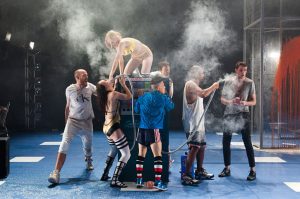Malthouse Theatre, Southbank
Reviewed on July 2, 2014

Bertolt Brecht was a prolific German poet, playwright, theatre director and devout Marxist. The Threepenny Opera (1928), and Mother Courage and Her Children (1941), are two of his better – known and most – revived plays.
Brecht also helped to establish and promote an early twentieth century cause known as Epic Theatre. Developed as a reaction to popular live drama, the movement used many devices to capture public interest, invoke critical response, and reveal conventional theatrical manipulations.
Some of these revolutionary tricks included flooding the entire stage and auditorium in bright light, casting actors in multiple parts, moving sets and changing costumes in full view of the audience, and allowing players to break the fourth wall.
One final key vital to the process, viewers were at no point allowed to forget that they were watching a play.
A cross – cultural collaboration between the Malthouse and the National Theatre of China, The Good Person of Szechuan (1943) is now reinvented for Melbourne audiences by the acclaimed avant garde director, Meng Jinghui.
Meng is somewhat of a rock star in his homeland.
He has 2.5 million Weibo followers, which is the Chinese equivalent of Twitter. His long – running road show, Rhinoceros in Love, still draws full houses ten years on and counting.
With a text newly translated by Tom Wright, The Good Person of Szechuan’s co-production will tour China later this year. The show is bound for both the Shanghai International Arts Festival and the Beijing International Theatre Festival.
The story revolves around Shen Te, a struggling prostitute who takes in three homeless strangers one night. Despite her own abject poverty, she is financially rewarded for her efforts when they reveal themselves as gods.
Using their money to buy a small tobacco shop, she sees this charity as a chance to transform her life. Soon however, greedy townsfolk overrun the store wanting their slice of the action. Too kind to resist their demands, Shen Te eventually dresses in disguise as a bossy male cousin, Shui Ta, to fix the problem.
Brecht’s complex tale is a multi-layered yet accessible character study. It explores and blurs what drives humans to do good, evil, or both at once. With a running time of two hours plus, that tenuous balance is eventually thrown to the audience for us to decide. At its core, The Good Person of Szechuan is ultimately a morality play, yet it still contains a powerful closing punch.
This production is similar in look and feel to grunge cult motion picture classics like Blade Runner, Brazil, Little Fish, Alien, 28 Days Later, Children of Men, Grindhouse, Soylent Green, Warm Bodies, or even Shaun of The Dead.
Set and costume designer, Marg Horwell has taken a typical Australian working class suburb and transformed it into a spare, smoky, post apocalyptic music video mélange rife with absurdist symbolism.
A towering central turret acts as a portal between this and the next world. Sofas border her design under a harsh fluorescent glare; stages left and right look like an abandoned airport departure lounge or doctor’s waiting room.
Vending machines and petrol pumps double as hookah pipes or bongs. Shopping trolleys filled with plastic toy babies are casually strewn in the shadows. Their purpose is to perhaps highlight thoughtless consumer waste.
Finally, a grotesque wedding banquet late in the play takes on humorous Last Supper proportions. These are some of the mysterious metaphoric overtones on show.
Peter Goodwin of The Sweats has created the show’s thumping score. Taking half a dozen eighties and nineties pop hits, Goodwin has reshaped and remixed them with a funky Daft Punk sensibility.
Coating their dialogue with Underbelly flair, the cast of nine is uniformly excellent. Each member is allowed his or her moment to shine in the spotlight. Further, in keeping with the philosophy of Epic Theatre, seven of the actors take on multiple roles as well.
Moira Finucane is compelling as the central characters of Shen Te and Shui Ta. In her care both protagonists are clearly defined and carefully conflicted opposites.
Genevieve Guiffre, Emily Milledge and Genevieve Morris are exceptional as the three gods. Morris in particular, plays the secondary role of Mrs Shin to hilarious comic effect.
Sit back as if it were a rock opera helmed with flamboyant excess by Baz Lurman, Bob Fosse, Terry Gilliam, or Ken Russell, and you will enjoy where this fascinating microcosm is heading.
Image Source: Malthouse Theatre
